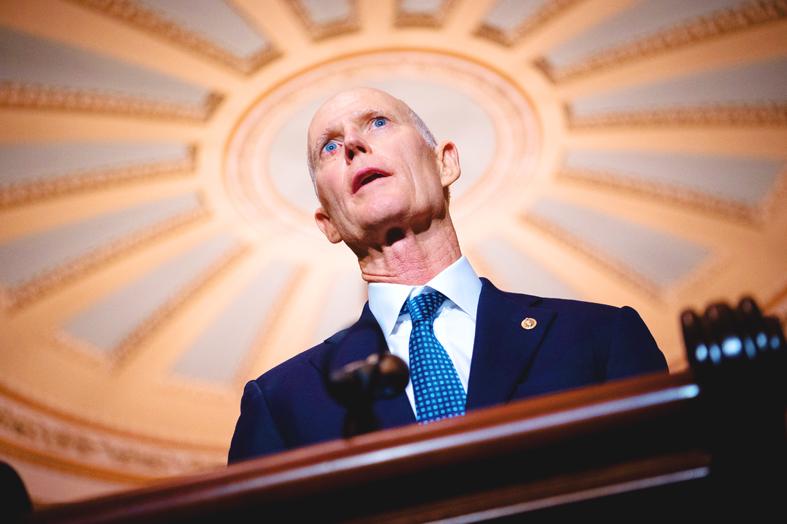Three US senators have proposed a bill that would allow for financial sanctions against China in the event of an attack or invasion of Taiwan.
US senators Rick Scott, Kevin Cramer and John Kennedy introduced the deterring communist Chinese aggression against Taiwan through financial sanctions act, which would seek to impose financial sanctions on Beijing should it invade, blockade or enact regime change in Taiwan through the use of force.
The act would sever all financial transactions between the US and China in such an event, and also require the US president to implement sanctions within 30 days.

Photo: EPA-EFE
Sanctions would include a ban on transactions of property, the revocation of visas and restrictions on Chinese nationals involved in the use of force against Taiwan; restrictions on transfers of credit or payments between financial institutions with China; a ban on investment in equity or debt of sanctioned persons; and a prohibition against financial engagement with Chinese military and software companies, financial messaging systems and digital currencies.
Taiwan is one of the US’ most important partners in the Asia-Pacific region, and its peace and stability are in Washington’s security and economic interests, Scott said in a statement on Wednesday.
“We have watched communist China’s increasingly frequent actions to harass and intimidate the Taiwanese people, through regular military encroachments and cyberattacks. We must be clear that these intimidation tactics will not be ignored,” the statement said.
“As Beijing quietly watches [Russian President Vladimir] Putin’s invasion of and assault on Ukraine, America must stand strongly behind our partners in democracy, and leave no ambiguity as to our resolve to condemn and punish tyrants who attack our partners,” it said.
He said that passing the bill would make clear to Chinese President Xi Jinping (習近平) that if he follows Putin’s example, he would face economic isolation and severe financial sanctions.

CHAOS: Iranians took to the streets playing celebratory music after reports of Khamenei’s death on Saturday, while mourners also gathered in Tehran yesterday Iranian Supreme Leader Ayatollah Ali Khamenei was killed in a major attack on Iran launched by Israel and the US, throwing the future of the Islamic republic into doubt and raising the risk of regional instability. Iranian state television and the state-run IRNA news agency announced the 86-year-old’s death early yesterday. US President Donald Trump said it gave Iranians their “greatest chance” to “take back” their country. The announcements came after a joint US and Israeli aerial bombardment that targeted Iranian military and governmental sites. Trump said the “heavy and pinpoint bombing” would continue through the week or as long

TRUST: The KMT said it respected the US’ timing and considerations, and hoped it would continue to honor its commitments to helping Taiwan bolster its defenses and deterrence US President Donald Trump is delaying a multibillion-dollar arms sale to Taiwan to ensure his visit to Beijing is successful, a New York Times report said. The weapons sales package has stalled in the US Department of State, the report said, citing US officials it did not identify. The White House has told agencies not to push forward ahead of Trump’s meeting with Chinese President Xi Jinping (習近平), it said. The two last month held a phone call to discuss trade and geopolitical flashpoints ahead of the summit. Xi raised the Taiwan issue and urged the US to handle arms sales to

State-run CPC Corp, Taiwan (CPC, 台灣中油) yesterday said that it had confirmed on Saturday night with its liquefied natural gas (LNG) and crude oil suppliers that shipments are proceeding as scheduled and that domestic supplies remain unaffected. The CPC yesterday announced the gasoline and diesel prices will rise by NT$0.2 and NT$0.4 per liter, respectively, starting Monday, citing Middle East tensions and blizzards in the eastern United States. CPC also iterated it has been reducing the proportion of crude oil imports from the Middle East and diversifying its supply sources in the past few years in response to geopolitical risks, expanding

Pro-democracy media tycoon Jimmy Lai’s (黎智英) fraud conviction and prison sentence were yesterday overturned by a Hong Kong court, in a surprise legal decision that comes soon after Lai was jailed for 20 years on a separate national security charge. Judges Jeremy Poon (潘兆初), Anthea Pang (彭寶琴) and Derek Pang (彭偉昌) said in the judgement that they allowed the appeal from Lai, and another defendant in the case, to proceed, as a lower court judge had “erred.” “The Court of Appeal gave them leave to appeal against their conviction, allowed their appeals, quashed the convictions and set aside the sentences,” the judges